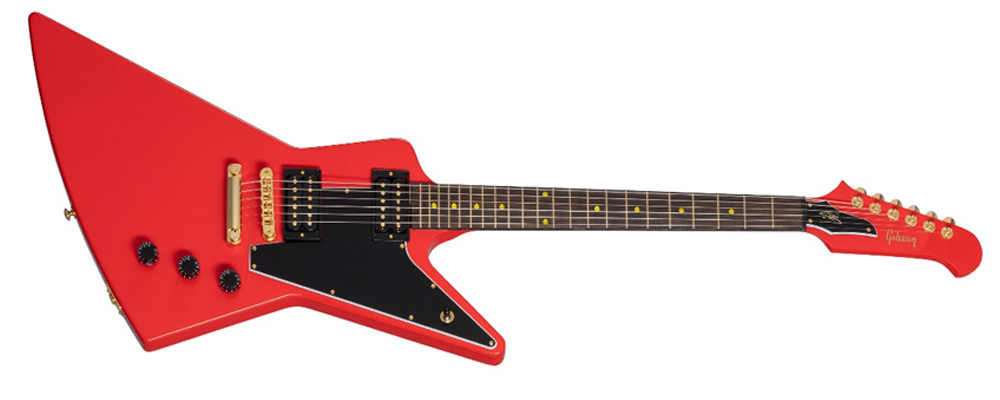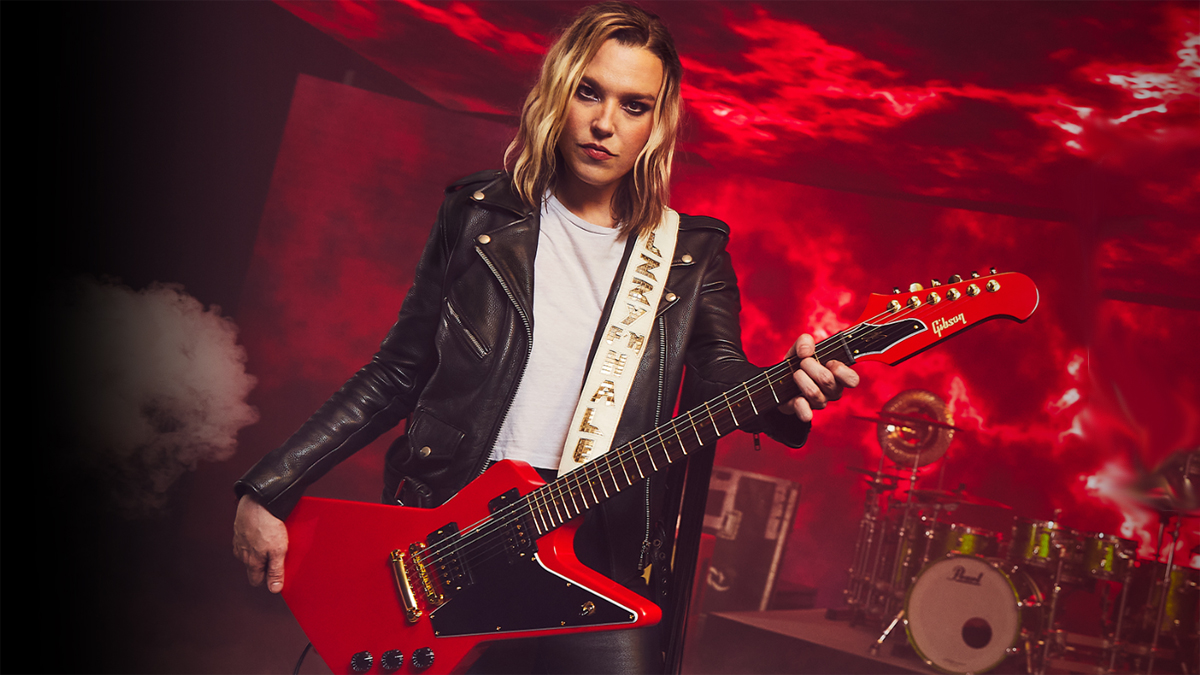Lzzy Hale: “When you get your first Gibson, it feels almost like it could play itself because there’s some kind of intangible magic”
Hale talks cult guitars, her identity crisis, the darkness behind new album, Back From The Dead – and the drinking session that inspired her purist-baiting signature Gibson Explorerbird

Like all the best brainwaves, Lzzy Hale’s new signature guitar started with a drinking session. It was NAMM 2020, and while the apocalypse rumbled in Eastern Asia, at the Anaheim Convention Center, the Halestorm guitarist was throwing back a few with the Gibson team.
Today, Hale insists her Explorerbird pitch was just the beer talking. “But you have to be careful what you say with my Gibson family. We’ll be having a pint and you’ll turn to someone and say, ‘You know what’d be cool? An Explorer body with a Firebird headstock.’ And then, a month later, something shows up at my door and it’s like, ‘Oh Jesus, I guess we’re doing this, then?’”
They were, and while Covid shunted the Explorerbird down Gibson’s itinerary, this inspired cut-and-shut of the luthier’s two cult heroes was ready in time for the Pennsylvania hard-rockers’ aptly titled fifth album, Back From The Dead. “I feel like whatever your poison is, this guitar can handle it,” Hale tells us. “Especially considering the way we beat on our guitars.”
Is that album title referring to the band or the human race as a whole?
“I think you can’t help but feel the weight of the world nowadays. Back From The Dead started out as a very personal record, but now it’s out in the world it seems more universal.
“I mean, for heaven’s sake, there are already people that have the lyrics tattooed on them. It’s like, ‘Guys, the record just came out, maybe live with it a bit before you ink it?’ But it’s just a beautiful lesson that we were all going through those feelings. So Back From The Dead is this kind of rallying war cry. Like, ‘You can’t hold us down!’”
You’ve said that writing this music helped you get out of a “dark spot”
Get The Pick Newsletter
All the latest guitar news, interviews, lessons, reviews, deals and more, direct to your inbox!
“Yeah. I went through a weird time. I’ve been in this band since I was 13, so when everything shut down, I had to look at myself in the mirror and be like, ‘Well, who am I? I’m no longer Lzzy Hale, getting up on stage in my high heels with my Explorer. Now, I’m Elizabeth Hale on the couch in her pajamas for three days. And I don’t know who this person is.’
I got reacquainted with the anxiety I hadn’t felt since high school and went through a bout of depression. So I had to kick myself in the butt and say, ‘What can you do?’
“I got reacquainted with the anxiety I hadn’t felt since high school and went through a bout of depression. So I had to kick myself in the butt and say, ‘What can you do?’ Well, I can still sit down and write out my feelings. I remembered why I still write music as a form of therapy, the way I did when I was a teenager.
“You know, my dad gave me this little section in his garage for songwriting because it was getting too noisy. He would pop in when I would be writing these angry songs and he’d be like, ‘Are you okay?’ And I’d tell him, ‘Yeah, I am now – because I got it out!’”
Do you think you became a better or worse player over lockdown?
“I believe I ended up getting worse as a player – and then I had to play catch-up as soon as we got back in the studio. There was a period where I couldn’t even look at the guitar without feeling sad. You almost question your love of music. But then it was like, ‘All right, stop pity-partying this. Just get your shit together and do something about it.’”
What did you and Joe Hottinger want the guitars to sound like?
“We ended up building up the tracks around my vocal takes, basically trying to match the lyrics and attitude, which made it a bit of a mission when it came to the guitars. We went in with [producer] Nick Raskulinecz and he’s a purist. We used real amps, real drums, real guitars… real people!”

This album also marks the studio debut of your Explorerbird.
“It’s been a long time coming. We first talked about doing this at NAMM 2020, right before the world changed. While we’ve been working on it, I feel like they should have set up a little pup tent for me at the Gibson factory.
“I ended up using that prototype they sent me on a lot of this new record – specifically, Back From The Dead and The Steeple because they’re both in drop C. There’s something about the Explorerbird – it’s probably because of the Firebird headstock – but it just stays in tune like a mother.”
What makes the Firebird and Explorer such a good combination?
“In their own right, they both have this seat at the table of rock ’n’ roll. Just those classic shapes and sounds. When somebody walks on stage with an Explorer, it’s not going to be country. So the combining of the two forces felt more natural than it should have been. At first, I was wondering, ‘Is this the right thing to do?’ When you see the Explorerbird on stage, it raises a lot of questions because you know there’s something different about it.
When you see the Explorerbird on stage, it raises a lot of questions because you know there’s something different about it
“The response has been amazing. I really wasn’t expecting that. I’ve put out signature things before and those went gangbusters, but this one was a little weird. I was nervous. I mean, ‘Is anybody actually gonna like this but me?’ It’s the same thing with our merch. Our management ask me, ‘Well, what would you wear?’ And I’m like, ‘Dude, anything I would wear, nobody will buy…’”
You’ve always been a fan of the Explorer model, haven’t you?
“Yeah. My first one was just standard, off of Craigslist. We were making our first record in LA and this guy had put it up for sale. It was such a hard story to read. He was selling all his guitars because of medical bills and was worried they weren’t going to find a good home.
“So when I went to his house I told him, ‘I’m in a band and she’s gonna be loved.’ We ended up keeping in touch, and he’s so happy his guitars are out there. As a guitar owner, if you’re going to sell something, you want to make sure it goes to someone who’s actually going to play it, not just hang it on a wall or stick it under the bed.”
This time – in the spirit of ‘the world is ending, go big or go home’ – I ended up choosing the ’70s Tributes. This guitar just screams a little harder
The Explorer and Firebird are kind of cult heroes, aren’t they?
“When it comes to Gibson, usually you’re thinking of the SG and Les Paul, even the V. The Firebird and Explorer, they’re definitely the outliers. But they have a very near and dear place, obviously, in my heart. I have both of them separately, and now I have one that’s the best of both worlds.”

Visually and spec-wise, it’s quite a departure from your signature Explorer.
“Well, for my first two signature models, I ended up going with the ’57 Classic pickups, which are the standard meat and potatoes. This time – in the spirit of ‘the world is ending, go big or go home’ – I ended up choosing the ’70s Tributes. This guitar just screams a little harder. I had to adjust my tone accordingly because the ’70s are definitely a little hot. I gotta roll down every now and then. It’s like, ‘Okay, I’m making a lot of noise!’”
There’s that Cardinal Red finish: you can see it from the back of the arena, man, and I feel cool when I wear it
How did go about choosing the Explorerbird’s tonewoods?
“Well, the mahogany body, it’s just a big hunk of wood, a beautiful coffee table [laughs]. I’ve already taken some chunks out of my particular model because I’m not necessarily super careful on tour. I’m running around, bumping into things.
“Obviously, there’s that Cardinal Red finish: you can see it from the back of the arena, man, and I feel cool when I wear it. And then, purely for aesthetic reasons, all the frets and hardware are gold because we wanted to be a little bit classier. You know, like, ‘She’s a classy bitch…’”
And you’ve chosen Gibson’s SlimTaper neck profile…
“Well, it’s a comfort situation. The tapered neck, it’s for ease of performance and also it just feels like home. A guitar has to be an extension of you. You can’t be going out there thinking that this appendage isn’t yours. You’re gonna end up playing differently.
“As for the rosewood fingerboard, that was kind of a happy accident because the first prototype had ebony. But then the next few models had rosewood and it was beautiful, with these streaks of natural red wood grain. I couldn’t stop looking at it. It was a little mesmerising. I was like, ‘Did I have this idea or did you guys accidentally put rosewood on the fingerboard? Because I love this!’”
I literally plug in and play, roll up and roll down – because this particular guitar screams a little harder
What amps are you finding complement the Explorerbird?
“There’s always a quest for tone; that’s a never-ending chase. I find that when I start getting used to something, I’ll say, ‘Okay, we gotta do something different.’ When we were in the studio, we used an absolute wall of amps – some Bogners, some Diezels for certain layering techniques.
“But with the Explorerbird, because of the ’70s pickups and because it’s meaner-sounding, I found just using my JCM800 and this guitar sounded the best. I ended up just using the break-up I get from the amp – I literally plug in and play, roll up and roll down – because this particular guitar screams a little harder.
“Now, my other Explorers with the ’57 Classics, sometimes I just need a little extra juice, so I’ll usually end up using my Klon [Centaur] distortion.”

Do you have a more expansive pedalboard for your live shows?
“I’m pretty much a purist with what we take out live because I have such great equipment now. Now we’re on the other side of Covid and we’re out on tour, I’ve found myself digging into that simplicity and seeing how much I can get out of just the guitar and amplifier. Everything else is icing on the cake.
“As far as my pedalboard goes, I have [an Electro-Harmonix] POG octave pedal, my Klon distortion, an MXR [MC401 CAE Boost/] Line Booster, and I’m using a [Way Huge Smalls] Aqua-Puss right now for a little bit of a delay situation. We have these sections in our set where we do some improv.
“We’re like, ‘Key of A, let’s go!’ We jam together and we’re not quite sure how we’re going to wrap it up, so I have a few things in place like the Aqua-Puss in case we quieten it down. And, obviously, I’ve got my Boss tuner on there, which is my favourite pedal of all. You can have the greatest distortion in the world, but if the guitar’s out of tune…”
What made Gibson such a magical luthier for you as a young player?
“It’s the backdrop for rock ’n’ roll. There’s Gibson and there’s Marshall and these are the tools my idols had used. When I first started working with Gibson in 2012, I told them, ‘You guys are like the one I was holding out for to ask me to the prom,’ you know? I’d been approached by a few different companies and none of it felt right, so when Gibson popped the question, it was like, ‘Oh my gosh, this is what I’ve been waiting for since I was 16 years old.’”
When I first started working with Gibson in 2012, I told them, ‘You guys are like the one I was holding out for to ask me to the prom,’ you know?
What’s your own history playing Gibson?
“I’d already had a couple of used guitars. My first-ever was a BC Rich Mockingbird. But my first Gibson I ever got, I had saved up from being a terrible waitress and I ended up getting a used Tobacco Burst Les Paul Custom, a ’91. I still have it; it’s beautiful. I’ve broken the neck twice and for some reason it sounds better now than it did originally. I took it to an amazing luthier and he fixed it all up for me.
“When you get your first Gibson and you strap it on, it feels almost like it could play itself because there’s some kind of intangible magic. And it’s a huge step for a young player. Because it’s like, ‘Now I have the actual tools that my idols were using. Now I have a pass to become a rock star.’ And then, all hell broke loose!”
- Back From the Dead is out now via Atlantic
Henry Yates is a freelance journalist who has written about music for titles including The Guardian, Telegraph, NME, Classic Rock, Guitarist, Total Guitar and Metal Hammer. He is the author of Walter Trout's official biography, Rescued From Reality, a talking head on Times Radio and an interviewer who has spoken to Brian May, Jimmy Page, Ozzy Osbourne, Ronnie Wood, Dave Grohl and many more. As a guitarist with three decades' experience, he mostly plays a Fender Telecaster and Gibson Les Paul.
“Freddie King would ask me why I never tried using thumbpicks... I really like digging in with my fingers”: He replaced Jimi Hendrix in Little Richard's band, was idolized by Stevie Ray Vaughan, and is one of the most underrated Tele slingers of all time
“When I heard Sonic Youth, I was like, ‘I need a Jazzmaster, and I’m gonna put duct tape on it!’”: Bartees Strange on working with superstar producer Jack Antonoff, his vintage guitar collection, and emulating Neil Young’s “spluttery” guitar sounds










